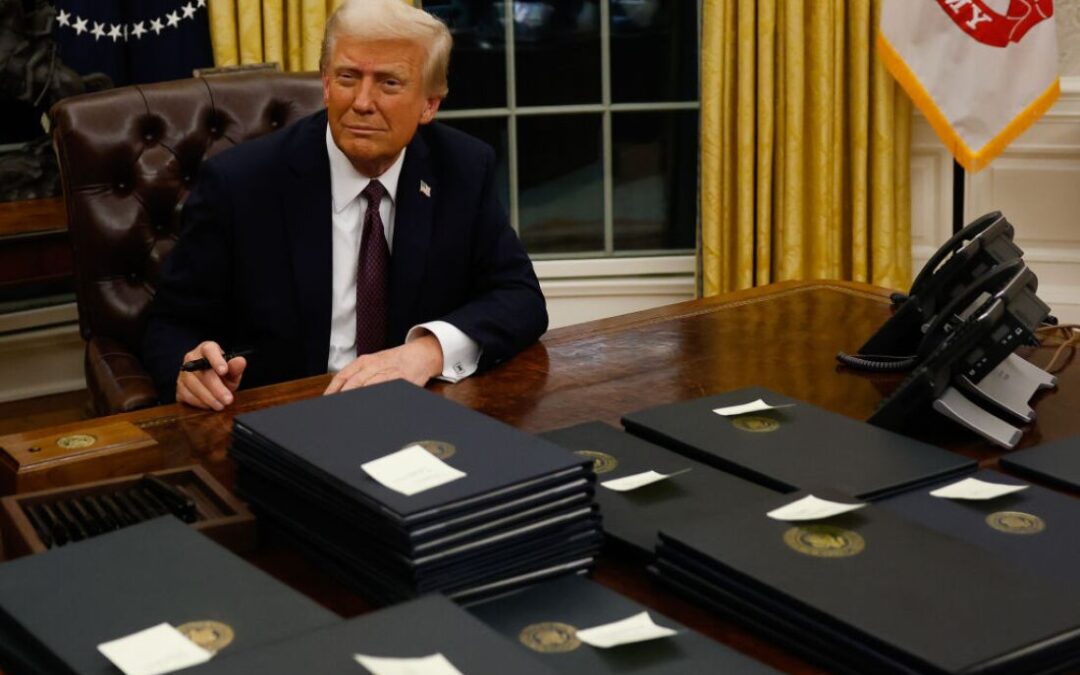Source: NPR
Reversing the Biden Administration’s Freeze on LNG Export Permit Approvals, Trump’s Executive Order Reopens Path to Economic Growth and Strengthens U.S. Energy Leadership on the Global Stage.
On his first day back in office, President Donald Trump issued a landmark executive order aimed at resuming the approval of liquefied natural gas (LNG) export permits, reversing the Biden Administration’s January 2024 decision to freeze approvals. This pivotal action restores confidence in the U.S. energy sector, ensuring that Texas—America’s leading producer of natural gas—can continue to play a key role in global energy markets, providing jobs, economic growth, and critical energy security for allies abroad.
Texas is at the forefront of the U.S. LNG sector, accounting for approximately 30% of the nation’s total natural gas production. The decision to resume LNG permit approvals directly benefits Texas, where major projects, such as Sempra’s Port Arthur LNG, were put on hold by the Biden Administration’s policy freeze. By allowing these projects to move forward, Trump’s executive order ensures continued investments and thousands of jobs in Texas and across the country.
The move is particularly important at a time when global energy security is at risk. As Europe seeks alternatives to Russian energy supplies and countries in Asia and the Pacific experience rapidly growing energy demand, U.S. LNG exports have become essential. As Todd Staples, President of the Texas Oil & Gas Association (TXOGA), previously stated, “U.S. LNG exports have not only supported the U.S. economy but have provided critical energy security for our allies around the world.”
Since LNG exports began to grow, Texas has seen significant economic benefits, with the industry supporting thousands of jobs across the value chain. TXOGA estimates that LNG exports support 18,000 direct jobs in Texas, and the sector drives billions in investment, creating broader economic activity. The freeze on new LNG permits created uncertainty, threatening these economic gains and delaying essential infrastructure projects that could have brought in even more revenue and jobs.
Contrary to claims that LNG exports raise domestic natural gas prices, TXOGA’s analysis has shown that exports have actually spurred increased production, driving prices down while boosting energy security. As Dr. Dean Foreman, TXOGA’s chief economist, explained last year, “U.S. LNG exports have not had a sustained and significant impact on domestic prices. In fact, they’ve spurred production gains that benefit consumers.”
The Biden Administration’s LNG export permit freeze faced strong opposition not just from industry groups, but also from bipartisan lawmakers and legal experts. Late last year, a U.S. District Court in Louisiana ruled to end the export permit halt, deeming it unjustified. This decision confirmed that halting LNG exports undermines both economic growth and global energy stability.
Staples welcomed the ruling at the time, saying, “The court’s decision is a victory for American energy, Texas jobs, and global energy security.” The ruling allowed Texas LNG to continue reaching international markets, keeping the state’s energy industry vibrant and ensuring energy stability for U.S. allies in Europe and Asia. But its future was still in doubt, as others sought to pause or even ban LNG exports.
Trump’s executive order marks a pivotal moment for U.S. energy policy. By restoring the LNG permit approval process, the order ensures that Texas can maintain its leadership role in the global energy market, positioning the state—and the country—as a long-term provider of secure, affordable energy.
Moreover, the decision aligns with Texas’ broader energy strategy, including the state’s recent creation of a $5 billion Texas Energy Fund to help foster additional development of natural gas infrastructure. As Texas continues to lead on energy innovation and security, the state remains committed to providing affordable energy both domestically and internationally.
By resuming LNG export approvals, Trump’s executive order restores a vital part of the U.S. energy strategy, safeguarding American jobs, energy security, and global leadership for years to come.

